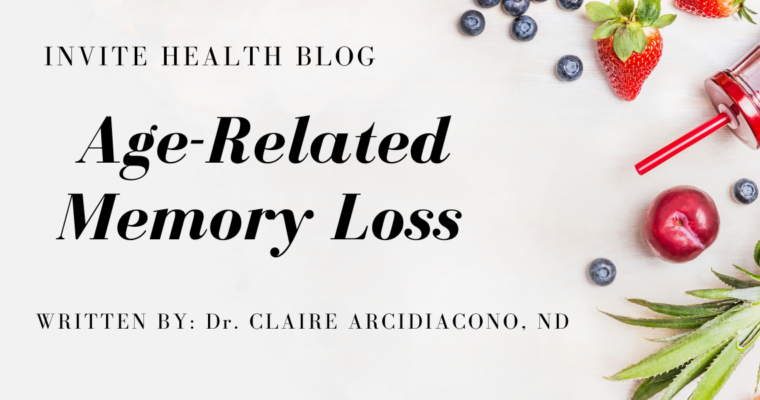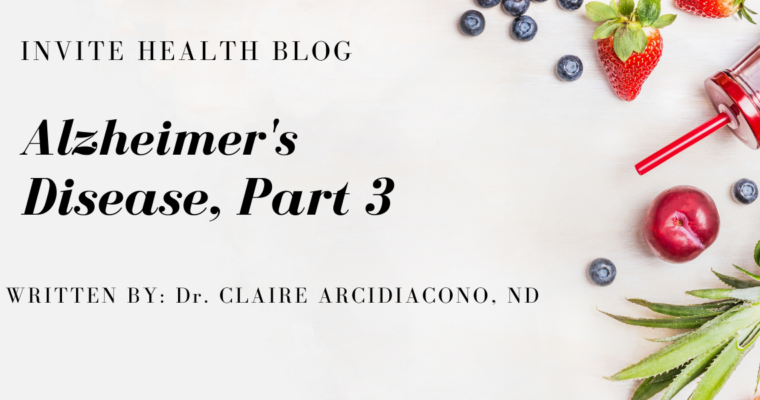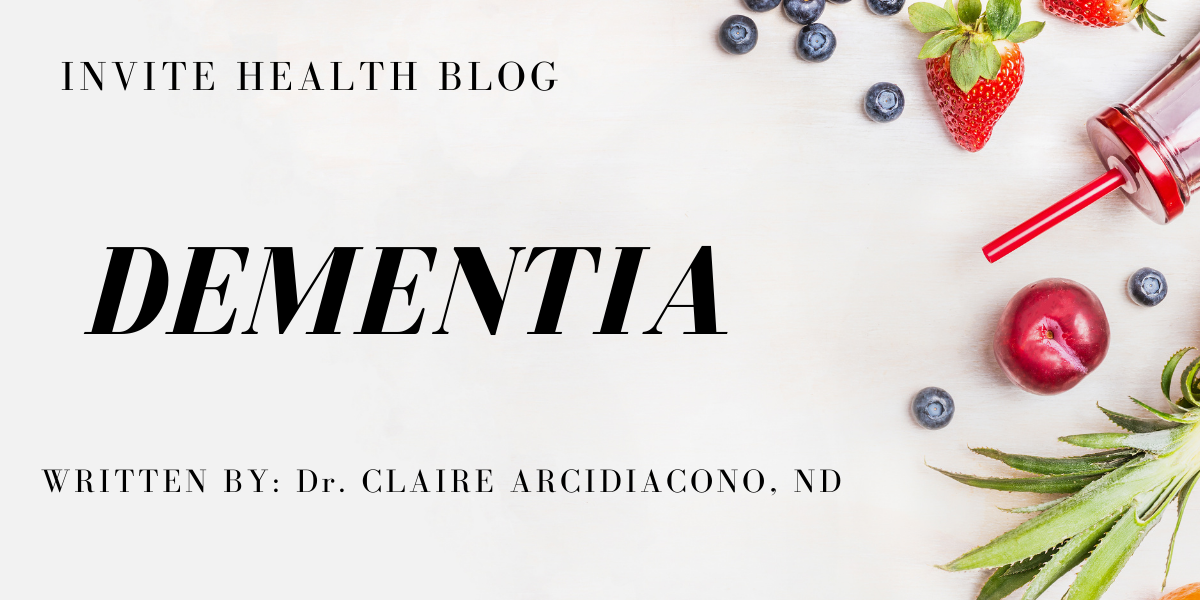Written by: Dr. Claire Arcidiacono, ND
For further questions or concerns email me at [email protected]†

Dementia is a complex issue that concerns many people. Dementia is a complex topic because not only is it considered by many to be a neurocognitive disorder on its own, but it is also a part of many other neurodegenerative diseases such as Alzheimer disease. In this blog I will review what is dementia? What are the signs and symptoms of dementia? What are the risk factors? What can you do if anything to help with the symptoms? And perhaps most importantly is there anything we can do to reduce the risk factors especially for those with a family history of dementia? †
Dementia is typically defined as a disorder that manifests as a set of related symptoms. In basic terms dementia is described as an acquired brain disorder where there is a decline in cognitive function. (1) There are a number of disorders that are associated with dementia. The most common disorder associated with dementia is Alzheimer disease. (2) Other disorders that are associated with dementia include Parkinson’s disease, Huntington’s disease, vascular disease, frontotemporal lobar dementia, and Lewy body disease and prion disorders. † (3)
Dementia can also occur when there are certain underlying conditions as I reviewed in my prior blogs. These include endocrine disorders as well as certain nutritional deficiencies. For more information on disorders that can mimic dementia please see my prior blogs. †
To start with Dementia as we know affects memory. However, in addition to affecting memory it can also affect behaviors. Dementia can lead to aggression, agitation, restlessness as well as sexual dis-inhibition. Dementia can also cause what is considered to be inappropriate behavior such as public outbursts of anger. In addition to behavioral changes dementia can also lead to psychological symptoms such as depression, apathy, anxiety, hallucinations and delusions. Over time language, attention and our problem-solving abilities also decline. Perception and orientation also decline over time. (4) Those with dementia are also more like to suffer incontinence (both urinary and fecal). (5) To sum things up – dementia affects our memory, attention, reasoning, communication and perception. Signs to look out for can include forgetting names and people and places. Using the wrong word for an object and having trouble completing tasks are also things to be on the lookout for especially in those with a family history. † (6)
Dementia is usually broken down into 4 stages. These stages include pre-dementia, early, middle and late stage. These stages are based on the severity of the functional and cognitive impairment. Using tests such as the mini mental state exam can help determine which stage of dementia is present. † (7)
What are the risk factors for dementia? The presence of any of the aforementioned conditions such as Alzheimer’s disease, nutritional deficiencies and alcoholism are all risk factors. (8) Additionally high blood pressure, smoking, obesity, diabetes, lack of activity are all risk factors. (9) Traumatic brain injuries also increase the risk of dementia. (10) Other more socioeconomic risk factors include conditions such as lower levels of education, depression, low social interactions, loneliness and having a neurotic personality. (11) Studies have also found that having vision and hearing impairments increase the risk of dementia. Frailty may also increase the risk of dementia. † (12)
New research has found a link between oral bacteria and the risk of developing dementia. (13) Herpes simplex virus has also been confirmed to be associated with Alzheimer’s disease and therefore dementia. † (14)
As I’ve said before certain deficiencies are a huge risk factor for developing dementia. Additionally, if there is gluten sensitivity then gluten is also a risk factor. (15) Newer studies have also found that symbiosis and increased gut permeability are also risk factors for dementia. In other words, digestive concerns such as leaky gut, inflammatory bowel diseases and an overgrowth of bad bacteria are all risk factors for dementia. (16) Last but not least family history is also a risk factor for developing signs of dementia. † (17)
ICYMI:THE BRAIN: BLOOD TESTS & MORE, PART 1>>READ NOW!
While no studies have as yet found a cure for dementia there are certain nutrients that studies find that are helpful for our brain and memory.†
LIFESTYLE CHANGES & NUTRITIONAL SUPPORT
- Change any lifestyle risks you can – stop smoking, treat any high blood pressure, diabetes and work on addressing obesity concerns. It is also important to get professional help for any concerns regarding alcoholism and or stress/ anxiety.†
- Correct any nutritional deficiencies! For help with this please see Invite’s complete line of multivitamins as well our B complex formulas! †
- Correct any infections by killing off the bad bacteria/ virus and replacing them with good bacteria! Additionally, along these same lines work to correct any digestive issues such as leaky gut. Olive leaf has been found to be antimicrobial in studies. (18) In addition to Olive leaf, and garlic has also been found to be antimicrobial in studies. (19) Interestingly thyme has been found to be very effective at killing Candida, which as we know is closely linked to leaky gut and thus by killing the Candida, we are working to address the leaky gut. † (20). Probiotics have been found to not only work to “put back good bacteria” but help eliminate the bad bacteria. (21) For these products, please see Invite’s Nutristatin 144, Aged Garlic, and our Women’s probiotic as well as our very popular Probiotic Hx!†
- Studies have found a Mediterranean style diet to be very helpful in reducing dementia risk. † (22)
- Some studies have found that omega 3s can help reduce the risk of dementia. (23) While using omega 3s for more advanced disease is still controversial studies have found significant improvement in those with very early-stage illness. (24) Please see Invite’s Fish oil, Krill oil advanced, Organic Flax seed powder and even our Bio-Mega!†
- Newer studies have found Alcar to be helpful in working with dementia and Alzheimer’s disease. While there was still a decline in functional and cognitive abilities it was statistically less in those taking Alcar (25, 26). Please see Invite’s Alcar with Ala, Cerebral care and Cognition Hx!†
- Inositol has been found to help with symptoms of dementia such as language. (27) Please see Invite’s Cerebral care!†
- Phosphatidylserine has been found in studies to help improve memory in those with dementia. (28) Please see Invite’s Phosphatidylserine as well as our Cerebral Care! †
While Invite has an extensive line of supplements I have chosen the ones that in my clinical experience are the most helpful. In our next blog we will talk about Alzheimer disease! †
ICYMI:KEEPING THE BRAIN CLEAN WITH RESVERATROL, INVITE HEALTH PODCAST, EPISODE 645>>LISTEN NOW!
REFERENCES
- “What is mixed dementia”. Dementia UK. Retrieved 2020-12-13.
- “Dementia”. www.who.int. Retrieved 26 September 2022.
- Wilson H, Pagano G, Politis M (March 2019). “Dementia spectrum disorders: lessons learnt from decades with PET research”. J Neural Transm (Vienna). 126 (3): 233–251. doi:1007/s00702-019-01975-4. PMC 6449308. PMID 30762136.
- Radue R, Walaszek A, Asthana S (2019). “Chapter 24 – Neuropsychiatric symptoms in dementia”. Handbook of Clinical Neurology. Vol. 167. pp. 437–454. doi:1016/B978-0-12-804766-8.00024-8. ISBN 978-0128047668. PMID 31753148. S2CID 208230186.
- “Continence, dementia, and care that preserves dignity”. NIHR Evidence. 21 June 2022. doi:3310/nihrevidence_51255. S2CID 251785991.
- Grant RL, Drennan VM, Rait G, Petersen I, Iliffe S (August 2013). Prince MJ (ed.). “First diagnosis and management of incontinence in older people with and without dementia in primary care: a cohort study using The Health Improvement Network primary care database”. PLOS Medicine. 10 (8): e1001505.
- “Preclinical, Prodromal, and Dementia Stages of Alzheimer’s Disease”. Practical Neurology. Retrieved 2022-06-28.
- Huntley, Jonathan D.; Corbett, Anne; Wesnes, Keith; Hampshire, Adam; Ballard, Clive (2017). “[P3–563]: Risk Factors for Dementia and Cognitive Function in Healthy Adults”. Alzheimer’s & Dementia. 13 (7S_Part_24). doi:1016/j.jalz.2017.06.1783. S2CID 53255124.
- “vascular risk factors and brain health” (PDF). Archived (PDF) from the original on 2022-10-09. Retrieved 1 January 2021.
- https://www.alz.org/alzheimers-dementia/what-is-alzheimers/causes-and-risk-factors
- Livingston G, Huntley J, Sommerlad A, et al. (August 2020). “Dementia prevention, intervention, and care: 2020 report of the Lancet Commission”. Lancet. 396 (10248): 413–446. doi:1016/S0140-6736(20)30367-6. PMC 7392084. PMID 32738937.
- Worrall L, Hickson LM (2003). “Implications for theory, practice, and policy”. In Worrall LE, Hickson LM (eds.). Communication disability in aging: from prevention to intervention. Clifton Park, NY: Delmar Learning. pp. 297–298. ISBN 978-0-7693-0015-3.
- “Can poor oral health lead to dementia?”. British Dental Journal. 223 (11): 840. December 2017. doi:1038/sj.bdj.2017.1064. PMID 29243693. S2CID 25898592.
- Carter CJ (February 2011). “Alzheimer’s disease plaques and tangles: cemeteries of a pyrrhic victory of the immune defence network against herpes simplex infection at the expense of complement and inflammation-mediated neuronal destruction”. Neurochemistry International. 58 (3): 301–320. doi:1016/j.neuint.2010.12.003. PMID 21167244. S2CID 715832.
- Schofield P (2005). “Dementia associated with toxic causes and autoimmune disease”. International Psychogeriatrics (Review). 17 (Suppl 1): S129–47. doi:1017/s1041610205001997. hdl:1959.13/24647. PMID 16240488. S2CID 11864913.
- https://bmcgeriatr.biomedcentral.com/articles/10.1186/s12877-020-01644-2
- https://www.alz.org/alzheimers-dementia/what-is-alzheimers/causes-and-risk-factors/genetics
- Lee O. H., Lee B. Y. (2010). Antioxidant and antimicrobial activities of individual and combined phenolics in Olea europaealeaf extract. Technol. 101 3751–3754. 10.1016/j.biortech.2009.12.052 [PubMed] [CrossRef] [Google Scholar]
- https://www.ncbi.nlm.nih.gov/pmc/articles/PMC8362743/
- https://www.ncbi.nlm.nih.gov/pmc/articles/PMC3074903/
- https://www.ncbi.nlm.nih.gov/pmc/articles/PMC8813855/
- https://www.alzheimersresearchuk.org/mediterranean-diet-associated-with-decreased-risk-of-dementia/
- https://www.news-medical.net/news/20230407/The-association-between-omega-3-polyunsaturated-fatty-acid-intake-and-reduced-risk-of-Alzheimers-disease.aspx
- https://alzheimersnewstoday.com/news/omega-3-supplements-help-slow-memory-decline-alzheimers/
- https://pubmed.ncbi.nlm.nih.gov/1944900/
- https://pubmed.ncbi.nlm.nih.gov/7723928/
- https://pubmed.ncbi.nlm.nih.gov/8843494/
- https://www.ncbi.nlm.nih.gov/pmc/articles/PMC2966935/









